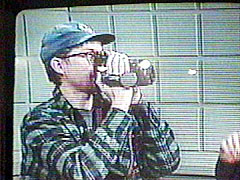|
|
TV: Communication or Manipulation?
Typology: articleContent:First published in Emoticon: community notes, circa 1998 by Bart Everson ("Editor B" of ROX) I've produced TV independently for a most of the '90s. My personal bankruptcy proceedings were finalized this July. It's a tough field to break into. These days I'm back in school, in the Department of Telecommunications at a Big Ten university. It's kind of strange to get formal training in something I taught myself. Since my enrollment began, I've had a few wrangles with one of my professors about the nature of electronic media. Specifically, she sees media as a means to "manipulate the audience." You might call my prof cynical, but for the bulk of commercial TV programming, she's right. Manipulation is the business of mainstream TV production. Consider TV as we know it. A crew of talented people do their darnedest to make an interesting program, so that an audience will stay glued to the set. Commercials are interlarded between scenes encouraging people to buy things. It's an almost Pavlovian manipulation of behavior. For all the sophistication of the copywriters, the whole model is crude and insulting to the intelligence of many viewers. So people flip the channels when a commercial comes on. You know the routine. There may be no passion, no rancor, no perverse impulse driving the production of a TV show. It's a business proposition, and a big business it is. The more people who are involved and the more money there is to be made, the less chance there is for communication from the heart. Manipulation is the order of the day, just as my prof says. Our increasingly cynical, skeptical, media-savvy citizenry probably agree with her. This only makes sense. Consider the source: our culture, dominated as it is by big corporations. Logic dictates that a medium of such power serve the interests of the most powerful. But the manipulative nature of TV is inherent in our culture, not in the technology of TV itself! As a TV producer I've come to regard my work as communication as much as anything else. I make TV for entirely different reasons than those discussed above. I've got something to say. I've got some things I need to get off my chest somehow and TV is just one of many ways to accomplish that. I want to use this medium to communicate, not manipulate. As I said, big media is and must be manipulative in nature. The ONLY way around this problem, if you choose to see it as a problem, is to stay small. On the Web we find the smalltime webcaster making TV available to the world. They are driven not by money (what money?) but by a need to communicate. Many are without talent. But those few who have the drive to communicate and the talent to do it well may find a larger audience through the Web. My point: television can be a means of communication. Webcast content creators who communicate to their audience (rather than 'merely' entertain them) will surely be the ones who succeed. Reviews:
|
Media for TV: Communication or Manipulation?:
Not yet...
Pix for TV: Communication or Manipulation?:
B shoots himself on the monitor in Studio Six.
|
|
| Up to... | ||
|---|---|---|
| ROX Ideas Index
| ||
| << |
ROX Home |
ROX Login |
Watch ROX |
Buy ROX
|
>> |
